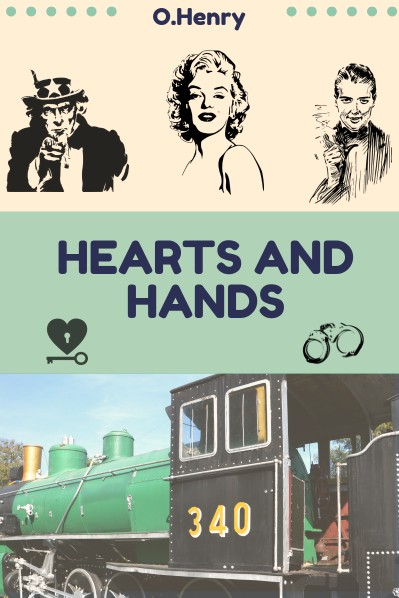
Hearts and Hands : About the story
Hearts and Hands is a well crafted, smart story which bears the stamp of O. Henry’s wit and his signature twist-ending. The story follows an incident involving three people : a policeman, a prisoner and beautiful lady. The two men happen to be on the same train as the young woman, on of them enters into a conversation with the lady and it is only towards the end that we come to know that the policeman is actually a prisoner and vice versa and that the girl has been taken for a ride by the two men.
Got No Time? Check out this Quick Revision by Litbug. Click on the link below
Hearts and Hands | Summary
The story is set in one of the eastbound B&M Express at Denver where we find a very pretty young woman ‘dressed in elegant taste‘ seated in one of the coaches. She is projected as an experienced traveler. This woman is shortly joined by two young men –“one of handsome presence with a bold, frank countenance and manner; and the other ruffled, glum-faced person, heavily build and roughly dressed.”
The duo sit opposite the pretty woman and are handcuffed together.
The woman seems to be an extrovert and recognizes her acquaintance (the poor handcuffed fellow) almost immediately. She smiles, stretches out her hand and speaks with a voice full, sweet and deliberate with a great degree of warmth and confidence :
“Well, Mr. Easton, if you will make me speak first, I suppose I must. Don’t you ever recognize old friends when you meet them in the West?”
Now the young man is caught in an awkward situation. After struggling ” with a slight embarrassment” he recognizes her, clasps her fingers and says :
” It’s Miss Fairchild. I’ll ask you to excuse the other hand ; it’s otherwise engaged just at present.”
Saying so, he raises his right hand bound to the left of his companion’s by a shiny bracelet. This poor bloke is screwed. Acquaintances and relatives have a sinister knack of showing up at the wrong place in the wrong time and when they are the least wanted.
Mr Easton, the poor young man, is about to speak again so as to offer an explanation, when his partner quickly intervenes :
” You’ll excuse me for speaking, miss, but, I see you’re acquainted with the marshal here. If you’ll ask him to speak a word for me when we get to the pen he’ll do it and it’ll make things easier for me there. He’s taking me to Leavenworth prison. It’s seven years for counterfeiting.”
He saves Easton’s reputation by saving that Easton is the policeman who is taking him to prison. Easton then begins to play along after this remark. He says that he had to do something in order to make some money, as a result of which he had to take up the marshalship in the West.
When the girl is disconcerted by the handcuffs, it is the other man who provides an explanation for Mr Easton :
” Don’t you worry about them, miss. All Marshalls handcuff themselves to their prisoners to keep them from getting away. Mr Eastern knows his business.”
The girl is amused at his decision to take up the marshalship, thinks about her own childhood and enters into a deep reverie, talking about how she spent her childhood with her mother, how fascinated she is by the West, how the air suits her and how money isn’t everything…
The glum-faced man isn’t interested in this meaningless banter and finally informs ‘Mr Marshall’ that he has been without smoke and drink for the whole day. The two begin to make a move and Easton bids the girl farewell saying that he cannot request somebody’s request for tobacco.
The girl says it’s too bad he isn’t going to the East after having expounded the qualities of the West only a short while ago. One hopes that the condescending portrayal of women is specific and not generic. In case of O Henry, one fears it isn’t.
The two move down the aisle making way towards the smoker. It is only when the two men have made their exit that we are given to understand the twist in the story through the casual remarks of two passengers seated next to them :
Said one of them : ” That marshal’s a good sort of chap. Some of these Western fellows are all right ”
” Pretty young to hold an office like that , isn’t he?” asked the other.
” Young!” exclaimed the first speaker, ” why–Oh! Didn’t you catch on ? Day-to-day did you ever know an officer to handcuff a prisoner to his right hand?”
Turns out, the real Marshal was pretending to be a prisoner in order to save Easton, the prisoner’s reputation. The girl has been taken for a ride after all.
Hearts and Hands | Analysis
This short, smart story captures the essence of O Henry’s craft : A tightly knit thoroughly enjoyable short story with a twist ending. Along with its wit, Hearts and Hands also touches upon the generosity of human nature. The manner in which the marshal saves the Easton’s reputation by presenting himself as a prisoner reveals the generous side of this man and the fact that he does it at the exact moment when it is required shows his presence of mind.
The way in which Easton responds to this change of roles and the synergy of wit between two individuals is commendable. This is despite the fact that the case at hand involves the uncanny duo of a policeman and a prisoner. What is very striking about the story is the ease with which the two men understand and adapt to each others’ move. The woman on the other hand seems to be ever ready to romanticize the position of the Marshall of ‘the West’.
“And so now you are one of these dashing Western heroes, and you ride and shoot and go into all kinds of dangers.”
This East-West classification of people and their manners is a recurrent feature throughout the story. The story exploits certain stereotypes as well and even verges towards condescension in its treatment of its female character.
In the course of the conversation, the girl asks Easton :
“But you must go on to Leavenworth, I suppose?”
“Yes,” said Easton, “I must go on to Leavenworth.”
The use of verbal irony is seen in these lines of the story when the ‘marshal’ bids goodbye. He doesn’t have a choice but to go to Leavenworth prison and the girl has no clue what he’s actually talking about. The characteristic unexpected ending of O. Henry has been so prolific in its use that it has, in fact, become the most expected feature of his stories.
The title of the story Hearts and Hands reflects not only the factual aspect of the story of how the benevolent and witty nature of the officer saves the face of the handcuffed prisoner. The treatment of the female character in the story (who is sandwiched between and hoodwinked by an exclusive-male plan of action) , and that too, between the cooperative and coordinated action of men who occupy contradictory ends of the socio-politico-legal spectrum is indeed less flattering. Also, the story explores various cultural stereotypes ( for example the East- West distinction) to show how such stereotypes are oftentimes misleading O Henry however does this by relying on another cultural stereotype – the idea of taking right-handedness as a given and assuming left-handedness to be virtually non existent among marshals. By attacking stereotypes with stereotypes, O. Henry creates a loop, a handcuff if you will, which binds together hearts and hands in a tightly knit tale of wit and humour.
About the author
The G.O.A.T of clever plots and surprise endings, O Henry was the pen-name of William Sydney Porter, one of the best American short story writers to write in that form. Porter was born on 11th September 1862 in Greensboro, North Carolina. As young man, Porter was a social butterfly who was not only a storyteller capable of lighting up a conversation but was also good on the guitar, the mandolin and even sang in church choirs. He started working from a young age and had become a licensed pharmacist by 19. He traveled to Texas in 1882 and worked in a sheep ranch. While at Texas, he took up numerous odd jobs as a shepherd, a ranch worker, a cook and a babysitter. He picked up some Spanish and German from immigrant workers and read a lot of classic literature. Porter married Athol Estes on 1st July 1882. Later, he worked as a draftsman for the Texas Land Office before switching as a teller at the first National Bank of Australia. In 1894, he was accused of embezzlement of funds and had to flee to Honduras where he wrote Cabbages and Kings. He had to return on hearing of his wife’s imminent death. Unfortunately, Estes died and he was sentenced to prison where he served a term for three years. It was during his term in prison that he wrote a number of stories under various pseudonyms which was forwarded to the publishers by a friend of his. By the time he was released, ‘O Henry’ had become a pretty popular name in print. He then moved to New York in 1902 and wrote a story story every week for the New York Sunday magazine which resulted in 381 stories. This was the beginning of a long writing career which would turn an unknown Sydney Porter to a household name.
Henry has written a massive collection of short stories. His writing has always been characterized by short tight knit plots, peppered with wit and humour, often topped off with his signature twist endings. Some of his iconic short stories include The Gift of the Magi, Squaring the Circle, Springtime A La Carte, The Third Ingredient and Hearts and Hands among others. Hearts and Hands demonstrates his penchant for wit and situational irony.
He married his childhood love Sarah Lindsay Coleman in 1907. Their marriage hit the rocks in no time. Porter’s alcoholism severely affected his health by 1908, Sarah left him in 1909 and he died on June 5th a year later.

